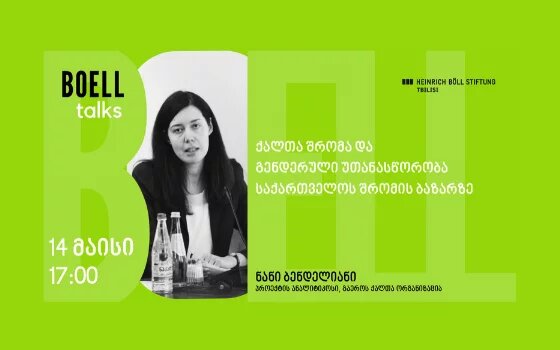On May 14, 2020, Heinrich Böll Stiftung organized the Online Discussion " Women’s Labour: The Gender Inequality in the Georgian Labor Market". Nani Bendeliani –Project Analyst, UN Women and Mariam Chanchaleishvili, gender program coordinator of hbs Tbilisi Office talked about the Women’s work in the context of epid-situation.

Even though women worldwide have taken important steps towards achieving a more equal status with men, economic inequality still remains one of the most pervasive and flagrant aspects of gender inequality. The persisting lifetime income gap between men and women is determined by many factors. For example, women still have more limited access to economic resources, including paid jobs; they are paid less than their male counterparts in the labour market; and they are far more often responsible for unpaid household labour and care work. The gender pay gap is one of the major causes of economic inequality between men and women.
Gender inequality in economic opportunities and labour markets has other important dimensions beyond those reflected in gender pay gap indicators. For example, women’s disproportionate burden of unpaid household and care work has consequences not only for wage equality but also for women’s participation in the labour market. For example, in Georgia, 44.4 per cent of women over the age of 15 are economically inactive (i.e. neither employed nor seeking employment) compared to 26.4 per cent of men in the same age cohort (2018 LFS survey). On the other hand, gender inequality in pay itself limits the possibility of individual families changing their domestic division of labour towards more equitable patterns.
In the context of COVID-19 epid-situation the gender inequality in the labor became more visible for the public together with the unpaid domestic work. In the times when many women lost their jobs or continue working only for reduced number of hours or reduced amount of pay, a significant number of women appeared to be working on leading positions or in the forefront of service delivery and healthcare systems, thus are put under higher risk. The epid-situation has also highlighted the economic insecurity of women working in informal sector. In the times when schools, kindergartens and day-care centers are closed, childcare has once again become the primary responsibility of women, in general. More people are forced to stay at home which in its way implies increased amounts of domestic work for women.
Language of the discussion is Georgian
ქალთა შრომა და გენდერული უთანასწორობა საქართველოს შრომის ბაზარზე - Heinrich Boell Foundation South Caucasus
 Watch on YouTube
Watch on YouTube
